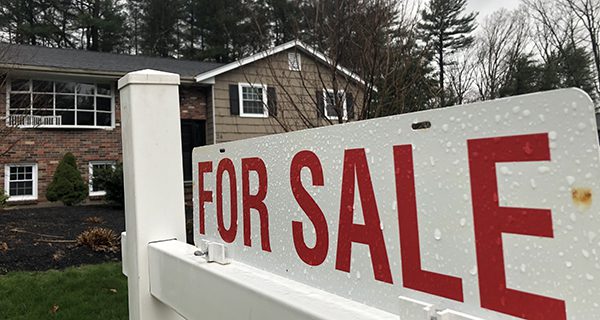By James Kinneen
Hometown Weekly Reporter
From sports to restaurants, hospitals to universities, every business in America has been significantly altered by COVID-19 and the social distancing rules it’s necessitated. Real estate has been far from immune from these radical changes, with agents significantly altering the ways they buy and sell homes in the face of a rapidly changing market.
Having spoken to nine real estate agents in the towns we represent, the most recurring issue they are dealing with was the most obvious: the lack of open houses. Gone are the days when nosy neighbors and casual passersby’s would show up on a lazy Sunday afternoon to peruse stranger’s bedrooms, investigate their closets and casually flip through coffee table photo albums. Now, agents are showing houses by appointment only and allowing a very small number of people into the house, fully clad in PPE or covered in hand sanitizer. While this change has kept the number of potential buyers lower, it has made them of a much more serious variety.
Aside from wasting everyone’s time and the obvious issues with strangers in your house, Kandi Pitrus of Berkshire Hathaway HomeServices Commonwealth pointed out that these private showings are also a huge pain for sellers of occupied homes. With no playgrounds or restaurants, they have to try and kill time elsewhere.
“Yesterday, I had a home inspection and my sellers had to leave the house for almost four hours with a three-year-old child,” she explained. “That’s a bummer. They had to just walk around for three and a half hours.”
Perhaps because of this, Rossana Gonser of RE/MAX Real Estate Center pointed to a client of hers taking the first buyer offer, rather than hearing potentially higher offers from other interested parties. Like many things during the crisis, this was a first.
Some agents have become so serious about making sure potential buyers can survive the possible economic recession that they’re researching the sectors in which the buyers work. While Tracy Boehme of Keller Williams is not doing so - she is instead assuming the buyer’s agent has vetted them properly and is taking the buyer at their word - she did note it is happening.
“I do know there are agents that are really asking a lot of questions about the buyers before they even let them into the property,” she confirmed. “They want to see a preapproval letter before they come, they want to see what industry they’re in to make their own determination - whether that’s an industry that may or may not be affected by losing a job.”
In the showings themselves, many agents noted the use of gloves, masks, and hand sanitizers. A few talked about how they turn all the lights on and open all the closet and cabinet doors to limit touching of anything. Kandi Pitrus even mentioned that some of her buyers are waiting a day or two to move into their new homes, knowing the virus can only live so long on surfaces.
As for where and what houses people are buying, an increased desire for home offices was a recurring theme, which makes sense given the increased amount of telecommuting. However, virtually all the agents said that they hadn’t seen a huge uptick in buyers caring less about proximity to Boston, despite the media’s insistence that so many jobs will remain “work-from-home” after the crisis, and cities being hotspots for the virus’ spread.
One trend that the crisis may have halted was downsizing. Apparently, parents finding themselves stuck in a house with college kids (who might soon be thrust into an extremely tough job market) don’t have a huge desire for a smaller house anymore.
“Another thing we are seeing is a lot of people that wanted to downsize, now that their kids have come back home, are thinking they may wait a little bit.” Coldwell Banker’s Elena Price explained. “I think you’re going to see these bigger houses become more desirable for people, whereas before, everybody was thinking smaller spaces, smaller homes.”
While the more expensive homes have always been tougher to sell, Linda Wigren of Real Living Suburban Lifestyle Real Estate noticed that outside of economic fears, the age of buyers is also playing a role. On top of the economic downturn, more expensive homes are usually purchased by older buyers - the same ones who are now less willing to leave their homes due to the increased risk COVID-19 represents for them.
“In the lower price ranges, there’s still a lot of activity - which is probably due to it being so hard to get a house in the lower price ranges … when those houses come, up there’s still so much activity,” explained Wingren, “because [their buyers] tend to be younger people. Younger people are less concerned about being out in public right now.”
Plenty of jobs are in trouble because of the coronavirus crisis, but real estate agents are in a unique situation. While every employee in America that gets even a dollar in unemployment money is receiving 600 dollars a week from the federal government, Coldwell Banker’s Alison Brown explained that “real estate agents don’t really get laid off.” While that job security sounds great, it’s really not; most real estate agents are independent contractors who make all their money from commission. If they don’t sell, they don’t make money.
What does this mean? Well, in a process Brown described as a “culling,” Boehme descried as “thinning out,” and David Mamet described with a bunch of expletives in “Glengarry Glen Ross,” anyone who can’t sell houses right now is either staying home and waiting out the crisis, or abandoning the business completely.
And lately, it has been rough. Many agents noted they had heard of sales suddenly falling apart when buyers and sellers got nervous about their economic status, as the stock market crashed, and mass layoffs began. Considering springtime is considered one of the booming periods for selling houses, the timing of the crash didn’t do them any favors, either.
“In greater Boston, from 3-15-2019 to 4-6-2019, 2,365 properties went pending, which means accepted offers,” Coldwell Banker’s Susie Shortsleeve explained. “The next year, 3-15-2020 - which is about when the schools closed - to 4-6-2020, 1,416 properties went pending. So that’s a difference in units of 949. It was down 40 percent.”
In the face of these varying levels of adversity, adaptation is everything. Above all else, the big way agents have had to adapt is to make more things virtual. Almost every agent spoke of the increased dependence on technology, whether it meant virtual tours, more photos being put online, using electronic signatures, or holding digital showings on Facebook live. Tracy Boehme is even using a webcam to help people unwilling to have a stager inside of their home make the house look ready to sell.
Boehme also talked about Keller Williams’ increased remote training opportunities and webinars, but she made sure to mention that she has been providing more emotional support, moral support, and data to clients than she ever has had to before. And now, the “moving survival kit” she gives to buyers includes hand sanitizer and a whole pack of toilet paper, on top of the old standards like boxcutters, light bulbs and trash bags.
Still, agents are having success. Kathy Murray, who noted that her company, Coldwell Banker, may have had a leg up due to their being so tech-driven even before the virus, even managed to sell a house without the buyer ever having seen it in person. Other agents spoke about recent homes they have sold, and how the closings have limited the people there, which means they are closing deals.
Will the changes in the industry stick? Probably. “The company of the future will be here in six months, not six years,” Boehme argued.
“I do believe when we come out of this, the way people sell their homes and put them on the market [is] going to be a bit more careful and conscientious,” suggested Compass’ Melissa Mayer. “I do think the way we do business and the way we operate is going to be changed forever.”
Optimism nonetheless remains.
“I think once the pandemic is under control, the housing market will come back,” explained Susie Shortsleeve. “It may take a little while, but I think you’re going to see some declines followed by significant increases, because the inventory is low - and it has been low - so there’s going to be some pent-up demand. And, people have time on their hands to look at houses. So, I don’t think the housing market is going to get hit as severely as some people think.”
Most of the agents hoped that a pent-up demand would lead to a boom in sales once the crisis is over, or at least lessened severely. Whether that happens or not remains to be seen, but as at has with most businesses in America, this disruption will have altered how people buy and sell homes forever.

























